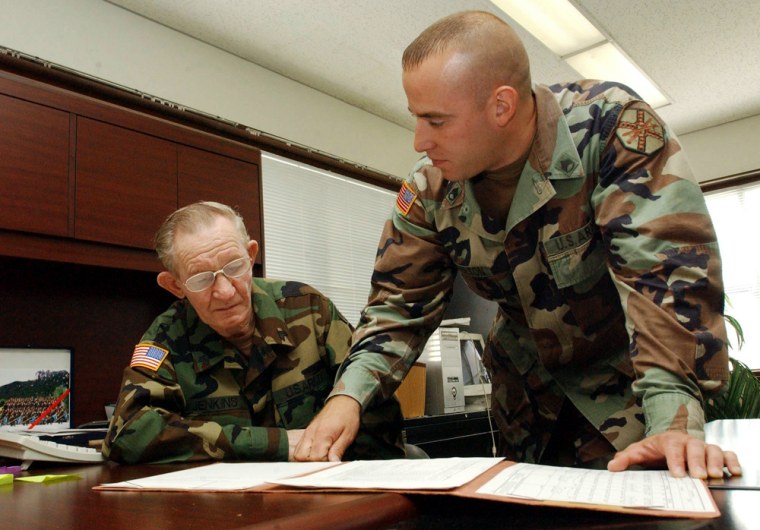The U.S. Army is preparing for its biggest desertion trial in decades following the surrender last weekend of Sgt. Charles Robert Jenkins, wanted for allegedly abandoning his patrol nearly 40 years ago and becoming a North Korean propaganda tool.
But while publicity is guaranteed, the prosecution might have a hard time winning the case, experts say. And if Jenkins does a plea bargain, as is widely expected, he may suffer nothing worse than a dishonorable discharge.
Jenkins has been living at this base just southwest of Tokyo with his Japanese wife and two North Korea-born daughters since he surrendered on Sept. 11. Pending an investigation to determine whether a court martial should be held, the frail 64-year-old has been put back in uniform and assigned to clerical duties with a new unit.
Base legal experts say a verdict could take from one to three months, and with sentencing two or three months afterward.
Besides desertion, Jenkins faces two counts of soliciting other service members to desert, one of aiding the enemy and two of encouraging disloyalty.
Soldier's voice heard in propaganda broadcasts
Shortly after Jenkins was separated from Company C of the 1st Battalion, 8th Cavalry, 1st Cavalry Division along the Demilitarized Zone in January 1965, his voice was heard in broadcasts urging other soldiers to join him. Years later, he appeared in anti-U.S. propaganda movies and taught English at a school for North Korean intelligence agents.
Jenkins has not publicly addressed the desertion charge. But he met repeatedly with a military lawyer before surrendering and is widely believed to be planning to propose a pretrial agreement that would limit his sentence in exchange for a guilty plea and perhaps information on his years in the secretive North.
Getting the agreement could be crucial to the military.
“It is very, very hard to prove desertion,” said Annette Eddie-Callagain, a former Air Force lawyer who now has a private practice on Okinawa, where many American troops in Japan are based. “You have to prove that the person intended to never, ever come back.”
Without such proof, the charge becomes the much lesser one of being absent without leave, or AWOL.
Eddie-Callagain added Jenkins may claim to have strayed into the North by accident, or to have been forcibly taken there. “If he was taken to the North against his will, he is entitled to a lot of back pay,” she said.
Jenkins’s wife, Hitomi Soga, was in fact abducted by North Korean agents in 1978 and held virtual prisoner until leader Kim Jong Il agreed to let her and four other Japanese abductees return home two years ago.
Why Jenkins would have deserted remains a mystery.
First tour ended with citation for ‘exemplary’ conduct
He joined the Army in 1955, and in November 1961, shortly after completing his first tour of duty in Korea, won a Good Conduct Award for “exemplary behavior, efficiency and fidelity.”
Pentagon officials say they have letters to support the desertion charge, but Jenkins’ relatives in North Carolina dispute their authenticity.
Maj. John Amberg, spokesman for the U.S. Army in Japan, said Jenkins was one of 2,490 people wanted for desertion in the FBI’s National Crime Information Center database, which goes back to World War II. He said 1,631 soldiers had been put on desertion status from October through June this year.
Punishment can vary widely.
In wartime, the maximum penalty is death. More than 21,000 soldiers were convicted of desertion in World War II, and 49 sentenced to death. But only Pvt. Eddie Slovak was actually executed, by firing squad in January 1945. No soldier has been executed for desertion since.
Sentences in peacetime range from life in prison at hard labor to a dishonorable discharge.
It hasn’t been determined which category would apply to Jenkins, who was accused of desertion after the 1950-53 Korean War ended in a cease-fire, not a peace treaty.
Japanese officials urge leniency
Prime Minister Junichiro Koizumi and other Japanese government officials have urged leniency so that the family can live together in peace.
Sheila Smith, an analyst at the East-West Center, a private think-tank in Honolulu, said that with military service an issue in the U.S. election, “There is a question in my mind as to what veterans might think about letting someone off for desertion in that context.
“It does open up the question of honor and service, and whether or not the system works for those who do put in their time and risk their lives.”
She added, however, that leniency might be called for in this case.
“My guess is that he would have preferred to have spent his life much, much differently,” she said. “A dishonorable discharge, if that is his punishment, seems enough.”
